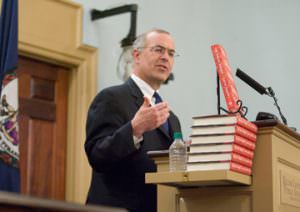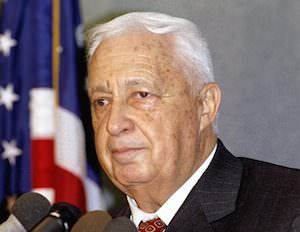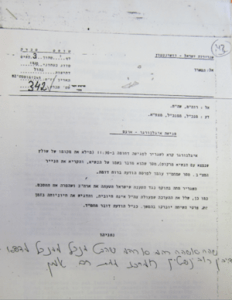Truthdigger of the Week: Peter Beinart
The historical corrections cited in a major column by the American critic of Israel are key to understanding the latest turmoil engulfing Gaza, the West Bank and the Jewish state.
Every week the Truthdig editorial staff selects a Truthdigger of the Week, a group or person worthy of recognition for speaking truth to power, breaking the story or blowing the whistle. It is not a lifetime achievement award. Rather, we’re looking for newsmakers whose actions in a given week are worth celebrating.
A power seizure, looted and vandalized greenhouses, a merciless purge of opponents and the start of an interminable missile campaign. If you’ve been within earshot of the American Jewish community recently, American pundit and Israel critic Peter Beinart wrote in Haaretz in late July, you’ve heard those ugly events transpired in place of the thriving economy Israel hoped a “newly independent” Gaza Strip would become when it withdrew from the territory in 2005.
“American Jewish leaders use this narrative to justify their skepticism of a Palestinian state in the West Bank,” Beinart states. “But in crucial ways, it’s wrong. And without understanding why it’s wrong, you can’t understand why” the present surge of Israeli aggression is “wrong too.” The catalog of corrections that follows is Beinart’s crucial accounting of major events during the nine years since Israel left Gaza that he contends engendered the latest turmoil engulfing the Strip, the West Bank and Israel. In short, Israel never left Gaza, Hamas didn’t seize power and Israeli sanctions dashed Gaza’s economic potential, Beinart argues.
Contrary to what’s widely said, Gaza did not become its own country after Prime Minister Ariel Sharon withdrew thousands of settlers from the territory in 2005, Beinart notes. Gaza never acquired control over its own borders. Israel decided who could enter and exit the Strip, controlled the population registry and issuance of identification cards and drew a restrictive security perimeter. That’s why it’s silly to compare rockets launched by Hamas to hypothetical fire from Mexico or Canada into the United States, he writes. Neither Mexico nor Canada are occupied. But Gaza has been occupied without pause since 1967.
Is it any surprise that Israel’s withdrawal did not meet Palestinian demands? Not even moderate Palestinian leaders would have accepted an arrangement in which Israel withdrew settlers and maintained control of the Strip’s borders, Beinart contends.
Additionally and crucially, rocket fire from Gaza did not start after the settlers left, but dates back to the start of the second intifada a half-decade earlier. “The Gaza disengagement did not stop this rocket fire. But it did not cause it either,” Beinart writes.
Second is the claim that Hamas “seized power and turned Gaza into a citadel of terror.” According to Beinart, the former didn’t happen. Instead, Hamas gained power through a democratic election. And not because it promised Gazans it would work to destroy Israel — a refrain that is heard in too many places, he notes. Hamas didn’t make Israel’s destruction a major theme in its campaign. Instead, it shaped its message to appeal to what exit polls showed were 75 percent of Palestinian voters and 60 percent of Hamas voters who supported a peaceful two-state solution. Improving Hamas’ chance at a victory were reports that just 15 percent of voters called the peace process the most important issue, while two-thirds cited corruption or law and order. A decade of the Fatah Party’s “unaccountable, lawless and incompetent rule,” Beinart writes, left the field wide open to Hamas, which had a record of delivering social services and was regarded as competent and honest.
Beinart points out that former President Bill Clinton confirms this account. He quotes Clinton as saying in 2009 that “a lot of Palestinians were upset that they [Fatah] were not delivering the services. They didn’t think it [Fatah] was an entirely honest operation and a lot of people were going to vote for Hamas not because they wanted terrorist tactics … but because they thought they might get better service, better government.”
Responding to Hamas’ victory, the Bush administration pressured Mahmoud Abbas, the leader of Fatah in the West Bank and president of the Palestinian Authority, to dissolve the Palestinian legislature. Abbas’ allies were urged to seize the Strip by force, and Israel contributed by withholding tax and customs revenue it had collected on the Palestinian Authority’s behalf, Beinart states. The effort at capture by force resulted in the infamous killings committed by throwing Hamas’ Fatah opponents off rooftops. But “some of that may have been payback,” he writes, because the leader of the push was widely believed to have overseen the torture of members of Hamas in the 1990s. Suggesting that Hamas seized power ignores the fact that it was responding to an attempted coup backed by the U.S. and Israel.Third, Beinart rejects the claim that Gazans sabotaged their own economy. Full of anti-Jewish resentment, Palestinians are said to have torn down greenhouses that vacating Israeli settlers left behind in hopes Gazans would use them to create jobs. Australian-Jewish businessman James Wolfensohn, who was involved in the greenhouse deal, does not endorse this account. Beinart quotes Wolfensohn as writing in his recent memoir that the greenhouses were left “essentially intact” and what really doomed the initiative were Israeli restrictions on the export of Gazan goods. “[T]heir success relied upon the Karni crossing [between Gaza and Israel], which, beginning in mid-January 2006, was closed more than not. The Palestine Economic Development Corporation, which was managing the greenhouses taken over from the settlers, said that it was experiencing losses in excess of $120,000 per day,” Beinart quotes Wolfensohn as writing.
It is an unfortunate fact that as a class, partisan pundits habitually treat statements of fact as bias-driven political arguments. Beinart confronts this circumstance head-on in a long passage from his conclusion.
“The point of dredging up this history is not to suggest that Israel deserves all the blame for its long and bitter conflict with Hamas,” he writes. “It does not. Hamas bears the blame for every rocket it fires, and those rockets have not only left Israelis scarred and disillusioned. They have also badly undermined the Palestinian cause.
“The point is to show — contrary to the establishment American Jewish narrative — that Israel has repeatedly played into Hamas’ hands by not strengthening those Palestinians willing to pursue statehood through nonviolence and mutual recognition.” It “played into Hamas’ hands when Sharon refused to seriously entertain the Arab and Geneva peace plans. … When it refused to support a Palestinian unity government that could have given Abbas the democratic legitimacy that would have strengthened his ability to cut a two state deal. And … when it responded to the group’s takeover of Gaza with a blockade that — although it has some legitimate security features — has destroyed Gaza’s economy, breeding the hatred and despair on which Hamas thrives.”
A distracted public cannot remind itself of what it may never have learned in the first place. Beinart’s essay stands as an antidote to the corrupting poison poured into the minds of average observers by pundits who are irresponsibly partisans of truth rather than champions of a distinct cause who are also faithful to facts. When it accumulates in those minds, disinformation leads to the triumph of policy that can result in death, as it has for almost 2,000 Palestinians since the start of Israel’s latest military campaign. Beinart’s piece makes it possible for those voters to know otherwise. For practicing fidelity in reporting to what actually happened, we honor him as our Truthdigger of the Week.
Your support matters…Independent journalism is under threat and overshadowed by heavily funded mainstream media.
You can help level the playing field. Become a member.
Your tax-deductible contribution keeps us digging beneath the headlines to give you thought-provoking, investigative reporting and analysis that unearths what's really happening- without compromise.
Give today to support our courageous, independent journalists.






You need to be a supporter to comment.
There are currently no responses to this article.
Be the first to respond.